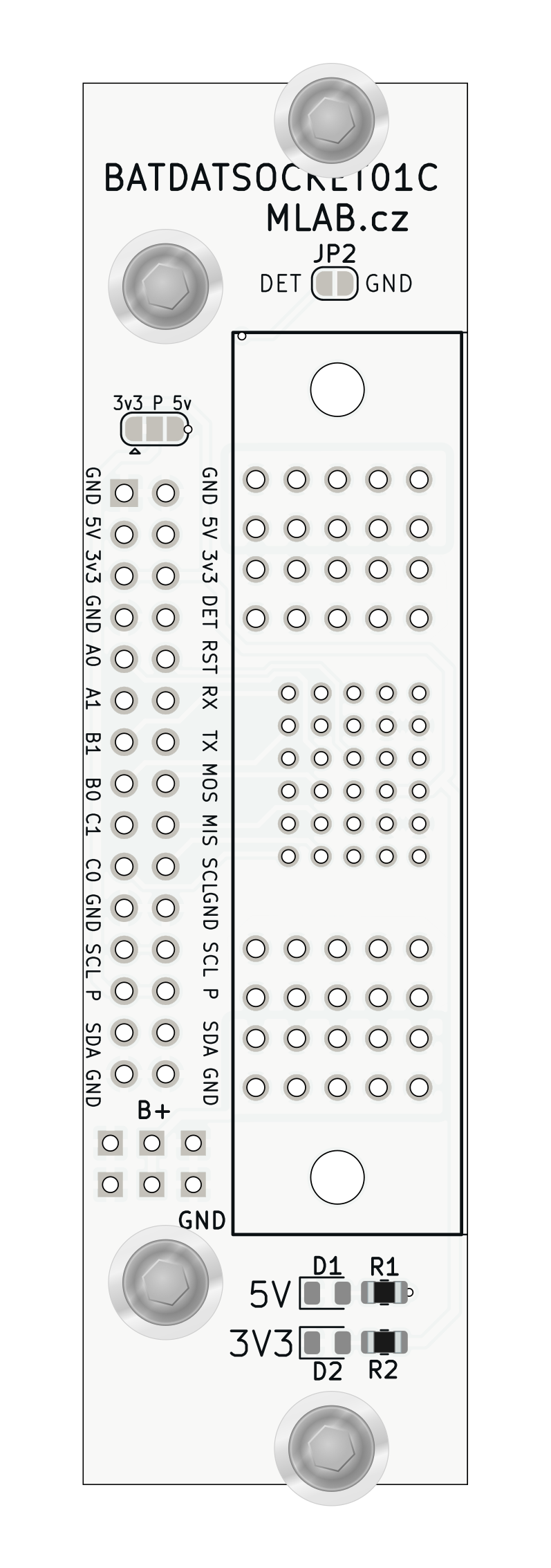
The BATDATSOCKET01 is a complementary module to the battery and data module BATDATUNIT01. It is a reliable power source for extended durations, making it an integral component in a wide array of detectors or measuring systems.
The BATDATUNIT01 is designed for versatility:
For more detailed information on interfacing and protocols, please refer to the BATDATUNIT01 documentation.
Designed for convenience, the module allows for fast detachment from the measuring part without tools, streamlining the replacement process. Data can be downloaded during battery charging thanks to onboard memory.
flowchart TD
subgraph a[User interfaceI]
USB[[USB-C\nData + power]]
UI1([User interface \n Button + battery indicator])
UI2([User interface \n Button + 3x LED])
end
USB --USB --> USW
FTDI -- I2C --> I2CSW
FTDI -- UART <--> MCU
MCU -- I2C --> I2CSW[I2C mux]
MCU[Microcontroller]
MCU --SPI <--> SDW
MCU --> SDW
subgraph one[Memory interface]
SDR[SD card] <--> SDI
SDI[SD card interface] <--> USW
USW[USB-SWITCH]
SDW[SD card \n SPI-SWITCH] <--> SDI
end
subgraph three[Digital part ]
USW -- USB <--> FTDI[FTDI\nI2C + UART]
I2CSW --I2C--> HYG[Hygrometer]
I2CSW --I2C--> ALT[Pressure sensor]
I2CSW -- I2C --> I2Cen
end
I2CSW --I2C--> GAUGE
I2CSW --I2C--> charger
GAUGE --> UI1
MCU --> UI2
GAUGE --> PWR3v3
GAUGE --> PWR3v3E
GAUGE --> PWR5vE
USW -- USB <--> FTDI[FTDI\nI2C + UART]
USB -- Power --> charger
subgraph two[POWER sources]
PWR3v3[Power supply\nfor internal 3.3V]
PWR3v3E[Power supply\nfor detector 3.3V]
PWR5vE[Power supply\nfor detector 5V]
charger --> GAUGE[Accumulators gauge]
GAUGE <==> LIION[(5x Li-ion cells)]
end
PWR3v3 --> MCU
PWR3v3E --> DI
PWR5vE --> DI
I2Cen[I2C switch] -- I2C --> DI
DI[[Detector interface]] == GPIO, SPI <==> MCU
A durable connector brings together data and detection elements with impressive mechanical resilience. It hosts UART, I2C, SPI buses, and extra GPIO signals, providing extensive interfacing options with various systems.